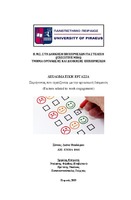Παράγοντες που σχετίζονται με την εργασιακή δέσμευση
Factors related to work engagement

View/
Keywords
Εργασιακές σχέσεις ; Εργαζόμενοι ; Εργατικό δυναμικό ; ΔέσμευσηAbstract
The 21St century has been fairly characterized as the century of rapid changes in all aspects of economic life and workforce relationships could not be the exception to that rule. Organizational structures are reformed and personnel and general management followed the same transitions. Human resource becomes mobile and volatile in such way that its retention proves to be rather difficult for modern organizations. Since employment is not restricted to just workforce legislation or economic data, but it also concerns human relations and interactions, the vast changes in financial conditions have also influenced the psychological contract of human organizational relationships. By psychological contract, we refer to the “deal” an employee makes with the employer, in which the former is engaged to remain for a large amount of time, probably all his working life inside the organization.
Engaged human resources is kind of a guarantee for the organization that it will remain focused on the plans and positive economic targets it has set. Such engaged employees comprise the ideal partner that has assimilated the organizational strategy, vision and mission, and is disposed to support the long and difficult road to changes. Engagement, thus, becomes a very useful tool for organizations in their effort to survive in the volatile environment they operate in. Engagement also, as a term goes far beyond traditional human resources management terms such as satisfaction and commitment to the business.
Prompted by the significant meaning of the term “engagement”, but also by the fact that as a term, engagement is rather new in contemporary literature, we define the term as per the modern literature. We re-define the meaning of engagement following the traditional human resources terminology and we also determine the demographic and physiographic factors that link an employee’s engagement to the organizational vision and mission. Such an important factor would be compensation and benefits. Hence, we analyze
all kinds of compensation and benefits in the contemporary organizations and their impact on engagement.
We finally try to apply modern bibliography theories in the pharmaceutical company Pharmanuxe (dummy trade name) through a quantitative research that was held between September and October of 2014, where the 450 employees of Pharmanuxe were invited to complete a quantitative questionnaire and 197 of them eventually participated in the survey. Our conclusion is that engagement links in a positive way to seniority and age and is also linked to overall job satisfaction. Engagement on the other hand is not directly linked to satisfaction from compensation and benefits thereby making managers’ aims to maintain employee engagement a rather challenging project for organizations.


